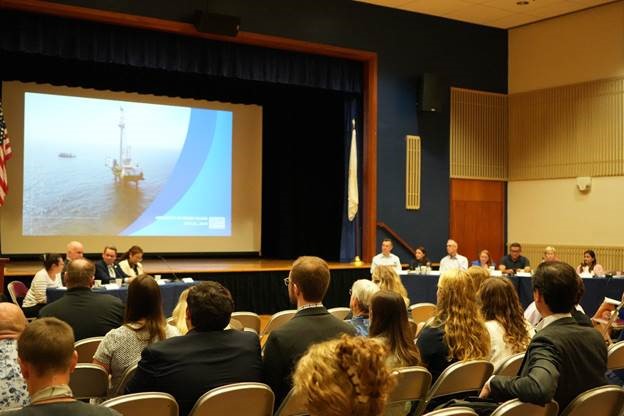Congressional Panel Hears How Commercial Fishing, Offshore Wind Industries Can Benefit One Another
U.S. Representative Seth Magaziner (RI-02) convened an important hearing in late July, asking local experts to inform his colleagues in the Rhode Island Offshore Wind Congressional Delegation about the relationship between offshore wind and the fishing community.
“Offshore wind has tremendous potential to lower energy costs, reduce dependence on foreign oil and create good-paying clean energy jobs,” said Rep. Magaziner. “As we know from our experience in Rhode Island, with thoughtful planning and community input, we can unleash the power of offshore wind while minimizing the impact on marine life and incumbent industries, particularly the fishing industry.”
Rep. Magaziner serves on the House Committee on Natural Resources, with roles on the Subcommittee on Energy and Mineral Resources and the Subcommittee on Water, Wildlife, and Fisheries.
New York Rep. Alexandria Ocasio-Cortez, Ranking Member of the subcommittee on Energy and Mineral Resources, also attended the July hearing.
Gary Yerman, Co-Founder and Fleet Manager of Sea Services North America, a collaboration among commercial fishermen and offshore wind developers, told the legislators that, yes, there is a very tangible cooperative that exists among the offshore wind and fishing industries.
“Yes, offshore wind creates uncertainty and physical inconvenience for fishermen, but it’s not the life-threatening issue some make it out to be,” said Yerman, a fisherman since the 1970s. “Offshore wind doesn’t rank in the top five issues threatening commercial fishing. Fishermen adapt daily to changing conditions to catch fish and support their families.
“Offshore wind is bigger but fundamentally the same. Mitigation funds are essential to cover real catch losses, but they are regressive. With U.S. wind farms open to fishing, substantial losses will be avoided. Regulators must balance interests and protect the natural world. Wind power advocates need to be as vocal as their fossil fuel counterparts.”
Magaziner came away more than impressed with Yerman’s testimony.
“Gary Yerman made it clear that the goals of the offshore wind and fishing industries are not mutually exclusive, and can be achieved by working together and engaging with local communities. We can both accelerate the responsible development of offshore wind energy while ensuring that the fishing industry can thrive,” said Magaziner.
Yerman later discussed the potential relationships between the fishing and offshore wind industries, reiterating that offshore wind companies can make significant, financial differences in a fisherman’s season. The Sea Services cooperative has helped more than 100 fishermen from Massachusetts to Virginia augment their incomes to date, while also teaching safety on the water.
“This isn’t about charity; it’s about mutual respect earned through excellent performance,” Yerman said. “It’s remarkable how constructive the dialogue becomes between our two industries when fishermen who work these waters win the right opportunities and then deliver more value than non fishing competitors.”
Yerman even shared a personal story from his nearly 50 years on the water.
“Five years ago, I was fearful, angry, and opposed. I thought offshore wind was the end of our way of life,” Yerman said. “My partners and I decided to investigate and form our own conclusions. We were fortunate that Ørsted, the company developing a project in our state, genuinely wanted to understand and share information.
“This ultimately led to the creation of Sea Services, the Fisherman’s Co-op, with a mission to increase safety at sea, provide fishermen with a modest new income stream when quotas are reached, and create a means for both industries to cooperate.”

